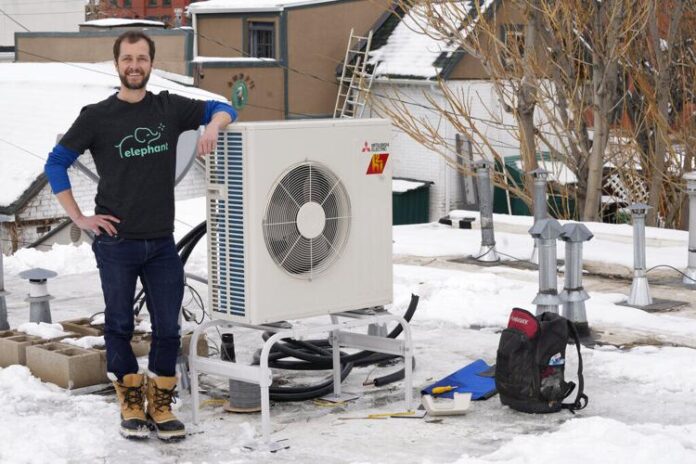
Randy Bracht | The Center Square
A Democratic-dominated alliance of governors representing 23 states and two U.S. territories is pushing for installation of 20 million heat pumps in buildings across the nation by the end of the decade as a major step toward eliminating carbon emissions and combating climate change.
The announcement by the U.S. Climate Alliance came Friday morning in New York City from executive director Casey Katims, New York Gov. Kathy Hochul, alliance co-chair Govs. Janet Mills of Maine, Jay Inslee of Washington, and White House national climate advisor Ali Zaida.
There is urgency in what they are advocating, said Hochul. “We’re the first generation to feel the effects of climate change, and the last generation that can do anything about it.”
She noted that just this year, New York had experienced record flooding and snowfall and some of the world’s worst air quality due to pervasive smoke from wildfires in Canada. Climate change is no longer a hypothetical, said Hochul, “It’s the here-and-now. It’s every day.”
And today, said the governor, “It’s all about the heat pumps.”
The units, which offer both heating and cooling functions, are more efficient, eliminate the use of carbon-based heating oil and natural gas, lower utility costs, and offer the prospect of green-energy jobs into the future, said advocates.
The hurdle the governors face in their push to normalize the technology is the price tag. According to Forbes Home, the systems can tack on up to $10,000 and as much as $30,000 to install if the home lacks pre-existing infrastructure.
According to the alliance, direct and indirect emissions from buildings account for more than 30% of all U.S. greenhouse gas emissions. Collectively, say members, installation of heat pumps with other remediation measures such as improved insulation can reduce that amount significantly. In part, that’s because 23 involved states and two territories represent 55% of the U.S. population and 60% of the U.S. economy.
Individually, they propose to combine state funding with grants, tax breaks and other incentives from the Biden Administration’s Inflation Reduction Act to quadruple heat pump installations in homes and businesses by year 2030, if not sooner.
“We’re starting to need air conditioning in Seattle, Washington, and that’s a problem,” said Inslee, noting that contrast to the Puget Sound’s long-standing reputation for cool, rainy weather. “All Americans have certain rights: to life, liberty, and the pursuit of heat pumps. They’re warm in the winter and cool in the summer.”
Inslee, one of the alliance founders, said Washington intends to use revenues from its cap-and-invest auctions, in which greenhouse gas producers must purchase credits for their operations, to “make polluters pay” for a multi-million dollar investment using state and federal funding to put heat pumps, rather than natural gas, in future homes.
Back home, that has been a topic of contention regarding future building codes between Inslee’s administration and building contractors in Washington.
But gas, Inslee insisted, “is an old, antiquated, dirty, dangerous product.”
“Climate change is primarily a fossil fuel problem … Those gas hookups need to stop, and they need to stop today,” he said.
Mills said Maine uses oil for home heating more than any other state, and heat pumps offer a more efficient and affordable alternative while curbing carbon emissions and creating jobs. She said 100,000 heat pumps have already been installed and there is a goal to add 175,000 more by year 2027.
Hochul said there is an issue of equity and fairness, and that 40% of resources for heat pump installations – coupled with components such as improved insulation — will go toward retrofitting the homes of lower-income individuals and disadvantaged communities where residents may experience high heating bills in winter, lack of air conditioning in summer, and poor air quality based on location.
“They do not deserve to live in ‘Asthma Alley,’” she said.
Zaida said it might be easy to “resign to a sense of doom and despair” over climate change, but countered that Friday’s gathering represented an opportunity to harness “the power and ingenuity of the American people” led by the involved states. And “decarbonizing buildings” can make a substantial reduction in both greenhouse gas emissions and home energy costs, said Zaida.
Zaida thanked the governors “for their leadership” in working with the Biden Administration toward “a very clear target … 20 million heat pumps in this decade.” For bold action, he said, “It’s a good bet to bet on the U.S.”
The commitments were announced during Climate Week NYC in New York. Alliance members cite a goal of decarbonizing buildings to achieve zero-emission new construction “as soon as practical” and accelerating efforts to eliminate emissions from existing buildings at a pace “consistent with emissions targets under the Paris Agreement.”
The alliance was launched in June 2017 by the governors of Washington, New York, and California following the Trump Administration’s decision to withdraw the U.S. from the Paris Agreement.
Within the alliance, the only current Republican governor is Phil Scott of Vermont. Other member governors and their states or territories are Katie Hobbs of Arizona, Gavin Newsom of California, Jared Polis of Colorado, Ned Lamont of Connecticut, John Carney of Delaware, Lou Leon Guerrero of Guam, Josh Green of Hawaii, JB Pritzker of Illinois, John Bel Edwards of Louisiana, Wes Moore of Maryland, Maura Healey of Massachusetts, Gretchen Whitmer of Michigan, Tim Walz of Minnesota, Phil Murphy of New Jersey, Michelle Lujan Grisham of New Mexico, Roy Cooper of North Carolina, Tina Kotek of Oregon, Josh Shapiro of Pennsylvania, Pedro Pierluisi of Puerto Rico, Daniel McKee of Rhode Island, Phil Scott of Vermont, and Tony Evers of Wisconsin.
Republished with the permission of The Center Square.













